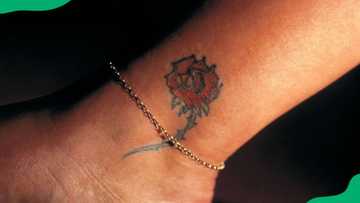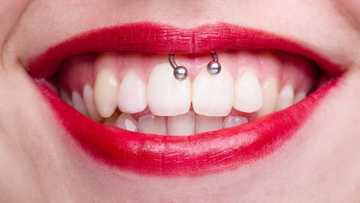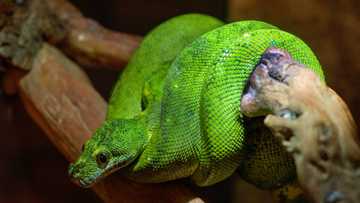Love pimples: Superstition, symbolism, and what they really mean
The appearance of pimples is usually a nightmare, especially when they emerge at the most inconvenient times. When it comes to love pimples, some cultures associate them with a particular significance other than an irritating skin issue. Read on for more on love pimples, their meaning, the superstitions around them, and how you can get rid of them.

Source: Getty Images
TABLE OF CONTENTS
Most people, if not everyone, have dealt with pimples at some point in their life. It is a standard adolescence feature although adults, especially women, are sometimes affected by the condition. Pimples are commonly caused by hormones and genetics, but other lifestyle-related factors can also contribute to a breakout.
What is a love pimple?
A love pimple is a type of inflammatory acne that appears on your face in the form of deep cysts and nodules, like an ordinary pimple. It can also be called a love bump, a hormone bump, or a stress bump.
Some cultures believe that its emergence is a sign of romantic thoughts or feelings. They think that the bump appears when you have a crush on someone, or someone has a crush on you.
Where does a love pimple appear?
Love pimple location varies, but they generally appear on the face. Like most hormonal acne, they usually break out around the nose or lips, mainly in the T-zone area of the face. Love pimples on the chin, forehead, and cheeks are also common.
A love pimple on the nose signifies romantic feelings towards another person. In some cultures, if the bump appears on the forehead, it is a sign that someone is thinking of you romantically. A bump on the chin may mean that you have a secret crush. However, these are just superstitions with no scientific backing.

Source: Getty Images
What causes a love pimple?
Love pimple is not a medical term recognized by dermatologists, but its occurrence at the start of a relationship or a crush can be explained medically. They are usually caused by stress, which is common during the early stages of a relationship or emotional situation.
The pressure to impress your partner or crush leads to hormone changes that can increase oil/sebum production in the skin, hence a breakout. The hormonal fluctuations or imbalances are similar to those that occur during menstrual cycles or puberty.
A breakout can also appear due to poor hygiene, for example if you fail to clean your face properly after wearing makeup. Touching your face with dirty hands or physical contact with another person can introduce oils and bacteria to the skin, causing acne. Following the wrong skincare routine, like using harsh products, can also lead to a breakout.
Eating certain foods, especially the ones with high sugar and dairy, has also been linked to a pimple breakout in some people. According to dermatologist Sandra Lee, MD, diet is not a major causal factor, but hormones have been proven to cause skin breakouts in general.
But there is not really a strong link to (diet). I think it has a lot to do with hormones that are actually put in our food. A lot of our milk or dairy food is pasteurized and there's a lot of hormones that are put in there.
How long do lip pimples last?
Lip pimples can be quite bothersome, but they typically resolve on their own. On average, a lip pimple may take up to two weeks to completely heal, but the duration can vary depending on the severity and treatment.
Mild pimples can clear up within three to seven days, while more severe forms, like cystic lesions, can last four to six weeks if untreated. It's important to avoid picking or squeezing them to prevent further irritation or potential scarring. If a lip pimple is particularly troublesome, a dermatologist can provide treatments that may reduce the healing time.

Source: Getty Images
How to get rid of love pimples
The treatment is the same as other types of pimples, although they usually go away on their own. According to Reid Maclellan, MD, a member of the adjunct faculty at Harvard Medical School and the director of Proactive Dermatology Group, treatment that works on one person may not work on another person (via Healthline).
Acne is not a one-size-fits-all treatment...Each individual person is unique and different, so what may work for one individual with a certain type of acne may not work for another.
Dr Jonquine Chantrey, a UK surgeon, recommends a holistic approach to getting rid of your pimples (via Forbes). It is crucial to understand the cause of the breakout before trying to treat it.
Looking for the underlying cause(s) and exploring how they can be managed. This is often multifactorial and complex — for instance, hormones, diet, stress and genetics. Treatment must involve a holistic approach but, of course, with a critical focus on skincare. A strategic skincare protocol tailored to the individual is imperative to treatment.
Here are some home remedies to try;
- Ensure you wash your face twice a day with a gentle cleanser to keep it free from dirt and bacteria
- Avoid using irritating products like astringents or harsh exfoliants
- Use a spot treatment with ingredients like benzoyl peroxide or salicylic acid
- Ice the area to reduce inflammation and swelling
- Apply a warm compress or steam to bring the pimple to the surface, which can help it heal faster
- Make an aspirin paste by crashing aspirin tablets and mixing them with water, then apply it to the pimple for 10 to 15 minutes
- Use hydrocortisone cream sparingly to reduce redness and inflammation
- Take care of your overall health by staying hydrated, eating a balanced diet, and getting enough sleep
If your pimple persists after trying any of the above remedies, consider consulting a dermatologist for expert advice.

Source: Getty Images
The love pimple superstition and symbolism are still prevalent today, but it is crucial to understand it as a natural skin condition. Ensure you maintain a healthy skincare routine and manage your stress levels for healthier-looking skin.
DISCLAIMER: This article is intended for general informational purposes only and does not address individual circumstances. It is not a substitute for professional advice or help and should not be relied on to make decisions of any kind. Any action you take upon the information presented in this article is strictly at your own risk and responsibility.
READ ALSO: Who are Loki's children? Discover his mythical offspring
Briefly.co.za shared fascinating facts about Loki's children from Norse mythology. The god of mischief was a father to five kids and a mother to one.
Loki shared children with goddess Sigyn, giantess Angrboða, and stallion Svaðilfari. His offspring had diverse roles that were tied to the fate of the gods of Asgard and the events leading up to the end times during Ragnarök.
Source: Briefly News






